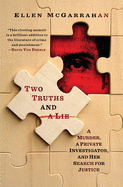
Ellen McGarrahan used to believe in an objective reality. That changed when she devoted a year of her life to learning the truth about the 1976 crime that led to the execution of Jesse Tafero, for which she volunteered to be present. While researching the riveting Two Truths and a Lie: A Murder, a Private Investigator, and Her Search for Justice, McGarrahan found herself bombarded with self-serving, conflicting testimonies. As a prosecutor put it to McGarrahan, "Murders don't usually happen in front of a busload of bishops."
The murders at the center of Two Truths and a Lie occurred on February 20, 1976, when a Florida state trooper and his Canadian-constable friend approached a Camaro parked at a rest stop 15 miles north of Fort Lauderdale. Inside the car were Tafero, a drug dealer and fugitive convicted rapist; his girlfriend, Sonia "Sunny" Jacobs, and her two children; and Walter Rhodes, who was on parole for armed robbery. After Trooper Black and Constable Irwin engaged with the Camaro's occupants, an altercation broke out that left both officers dead.
Readers of Two Truths and a Lie shouldn't expect a polemic against capital punishment, although it's possible to read the book as a slow-build evisceration of the American justice system's classism. Nor should readers expect McGarrahan's lucidly written deep dive to produce crystalline clarity about the case. McGarrahan would come to realize that this wasn't the point. "I'm writing a book about Jesse Tafero" was her opening gambit when reaching out to an interview subject, but Two Truths and a Lie is equally about Ellen McGarrahan. --Nell Beram, author and freelance writer

